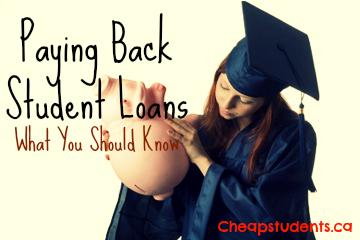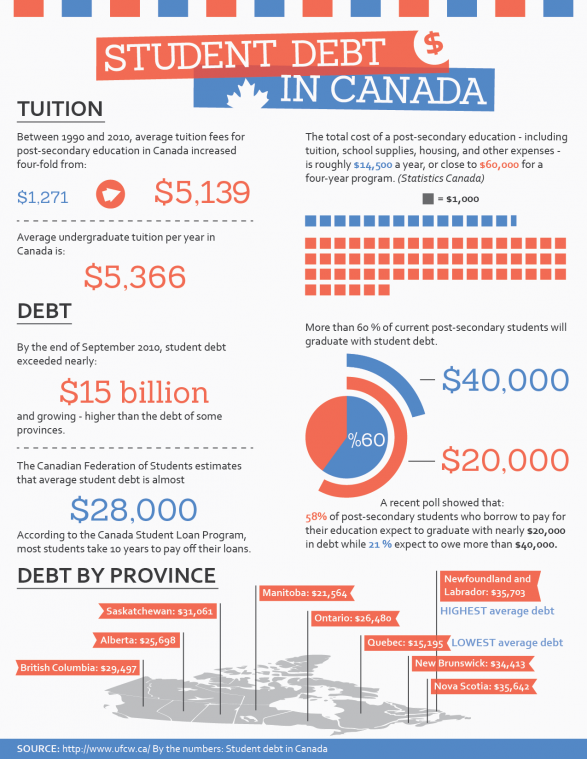Paying Back Student Loans: What You Should Know
I know everyone’s favourite topic to discuss, talk about and obsess over is student loans. Who can blame us for wanting to avoid talking about them or even thinking about paying back student loans in general but unfortunately everyone has to at some point. Everyone does have different circumstances, summer jobs and abilities to pay back their student loans but what unites us together is the fact that it needs to be done, and pay it off so we can move on with our lives to bigger and better things.
One of the most important topics for current university/college students is paying back student loans but it can be often cause quite a lot of stress for students while at school and once they are nearing graduation. This post will hopefully clear up some things, and make sure you are aware of the rates you will be charge while at the same trying not bore you to death as well 
Student Loans in Canada
In Canada we have an assortment of different provincial/territory run student loan programs that all fall under the overall Federal umbrella “CanLearn”.Things are pretty standard for the most part between provinces with interest rates also at the same levels for all programs. It’s important to make sure you understand all of the repayment related information including the interest rate you will be charged and when interest starts to be charged and that’s something I will discuss a little bit further down.
Paying Back Student Loans: What You Should Know
One of things I know from chatting here and there with friends and other fellow students is that there may be some misconceptions out there when it comes to student loans, repayment etc. There is a whole argument that I could get into but is really well covered in Student Loans: Do People Know What They’re Signing? and basically we all need to pay for college/university in some way, and as a result need student loans but aren’t educated enough in what the terms and conditions really mean when it comes to our loans. Thus we are confused, get charged more interest than we should (because we don’t pay on time, or in larger sums) and then end up being in more debt.
Things You really need to know
- You don’t need to start repaying your student loans until 6 months after you graduate
- Interest starts to add up as soon as you graduate, NOT 6 months after graduation. Even though you aren’t paying back your loan yet, you will be charged interest. Pay before the 6 months if you can, it will be worth it!
- Interest rates might be higher than a loan you would get from the bank, it’s partially because you didn’t get charged interest as soon as you took out the loan.
- Check out this loan repayment calculator where you can figure out how many payments you need to make, how much per month and with interest what your total loan will actually be once you finish all payments.
- You can choose floating or fixed interest rates, floating is better if you are making payments quicker and over a shorter period of time while fixed is for someone who will be taking longer to pay off their loans (and is also more risk averse). I’ll cover more on this in another post.
- Just like paying off a credit card it’s best to make larger payments above and beyond the minimum payment suggested.
- Part of your loan is responsible to the province (they charge a certain interest rate) and the other part is federal (they charge a different interest rate). For my Ontario loan I believe 70% is federal at a higher rate, 30% is provincial.
- You get a 15% tax credit on the interest you pay on your student loans through the government each year. This credit applies to interest payments you make on both your federal and provincial or territorial student loans. This information should be sent to you in the mail before you file your taxes
- Not sure how to actually start paying back your student loans? Check out CanLearn for everything you need to know.
Repayment Assistance Programs
Many of the provinces and territories in Canada have repayment assistance programs (RAP) that can help students who are unable to afford their loan payments after they graduate. Once again there is a super helpful calculator called the Repayment Assistance Estimator where you can determine if you qualify for a RAP if you are unable to pay back your loans right after grad.
Final Thoughts
Without making this post so long you wouldn’t want to read it any longer I decided to stop here. It’s a lot of information to digest and I will touch upon more details on making a plan to pay back your loans in the most effective way possible and maybe some interesting ideas as well (no not stripping…I know we all joked about that in first year right?). I hope this really gives you an idea of what you should consider and keep in mind when it comes to student loans. It’s unfortunately not all fun and games, and when you signed for these loans in the first place you probably weren’t as mature and educated as you are now, but you still have to pay them back. By reading this post you will be more prepared and save yourself some $’s in the process.
All information was gathered from Can Learn and it’s provincial/territorial partners.




Pingback: Paying Back Student Loans: What You Should Know « Tax Rate Calculator()